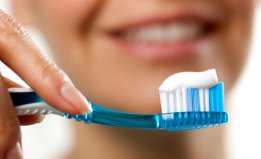Dentures are imitation teeth that are used to replace missing teeth. When people lose adult teeth, for whatever reason, there is a need for a replacement surface to aid chewing and speech, as well as to help keep the cheeks in shape.
Dentures (also known as false teeth) are imitation teeth. Dentures normally consist of a number of false teeth which are either mounted on a plate or clipped into place on existing teeth. Made of metal, nylon, acrylic or some other synthetic material, dentures are individually designed in order to provide as good a fit as possible.
Particularly if a number of teeth have been lost, dentures are often the best solution should implants be impractical or unsuitable for some reason.
As indicated earlier, the most common reason that dentures are required is that teeth are missing. This may be due to extensive decay which has resulted in an tooth being extracted, trauma or damage, gum disease, erosion or some other type of pathology. Most of the time, dentures are fitted to adults, as they are most likely to have a number of missing teeth.
Children can also be fitted with false teeth occasionally, usually because their existing teeth have been damaged in an accident of some sort.
Dental Implants are an alternative to dentures, but not all patients can tolerate implants. Poor bone density, for example, or on-going infection, can both be contra-indicators to implant surgery. Because dentures are a conservative treatment, they are also more easily tolerated by frail patients or those who don't like the idea of surgery.
Types of dentures
Although each set of dentures is unique, there are some similarities between the various types available. Partial dentures, as the name suggests, are used when just a few teeth are missing. They are frequently clipped on to existing teeth, bridging the gap between them.

Clips can be made of enamel-coloured material and the false teeth coloured to match existing natural ones. Full dentures are a complete row of teeth, mounted on a plate. Fitting snugly around the gums, these are held in place using dental adhesive to provide a firmer fix.
Some dentures (usually partial ones) are permanently clipped to the adjacent teeth. These can be harder to keep clean but do have the advantage of being very firmly fixed in place. In comparison, removable dentures (normally the plate variety) can be removed completely for cleaning.
Special cleansing solution is employed and the dentures are soaked overnight in order to ensure they are clean and ready for use the next day. Full dentures often require adhesive in order to stay firmly in place. It can be tricky to eat certain foods (for example those that are very sticky or chewy).
Particularly in the first few months after being fitted with full dentures, patients need to relearn to talk clearly and chew with the dentures in place. This is usually fairly easy to achieve and the majority of people with false teeth are able to eat and talk normally after a little practice.
What is the process for getting dentures fitted?
The dentist completes an initial assessment in order to determine which type of denture (if any) is going to be most suitable. The dentist checks the condition of the jawbone and gums, as well as decides what preparatory work, if any, is required. If any remaining teeth need to be removed or treated, this is done before impressions are taken.
The impressions are imprints of the teeth or gum area, which are used as the pattern for creating customised dentures.
Once the dentures have been made, a few follow-up appointments are usually necessary to check that the dentures have the right fit and have the right appearance to match your remaining teeth.
Denture prices
Dentures vary in price from around $900 through to about $2500, depending on the material from which they are made, the type of denture which is required and the individual charging policies of each dental practice.
How do I care for dentures?
Dentures are fairly robust items, but obviously, it makes sense to ensure that when not in use they are stored somewhere safe. They should be handled gently, with particular care taken not to damage any clasps or clips.
After each meal (or after eating), the dentures should be removed and washed thoroughly under a running tap. Users should also rinse their mouth thoroughly. Dentures should be brushed at least once a day with a denture brush or toothbrush to remove any detritus. At night, dentures need to be soaked in a suitable denture cleaning solution.
Remember to rinse off all the solution thoroughly before putting the dentures back in the mouth, as denture cleaning solution can cause nausea or pain if ingested.
How long do dentures last?
If your mouth stays the same shape, you can expect dentures to last somewhere between five to eight years. After that, your dentist will usually suggest a new set, as the shape of the gums and positioning of any remaining teeth will have usually changed in that period of time. This means fresh dentures are required to ensure a good fit.






